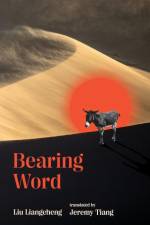av Liu Liangcheng
277
The world is full of ghosts, but only donkeys can see them. Meanwhile, in the human world, war has been waging for a hundred years with no resolution in sight, the death toll climbing higher and higher like the pagodas of sound built by donkeys braying and humans chanting scripture.Hsieh, a young jenny, is thrust into the care of Ku, who is tasked with bringing her across the immense desert between the two warring kingdoms. On a year-long journey filled with fearsome battles, headless ghosts and randy jacks, donkey and man come to realise the futility of this endless war and are forced to confront the most fundamental law of nature: everything has a soul.Set in Liu Liangcheng's home region of Xinjiang during ancient times, Bearing Word explores the power of sound and the many languages scattered across the vast expanse of the Gobi Desert, in a narrative set against the backdrop of a century-long war. About the Author:Dubbed a "bucolic philosopher", Liu Liangcheng was born in Xinjiang in 1962. After his first writing job at the Worker's Daily newspaper, he later turned to poetry, essays, and eventually (with the 2006 novel Loose Earth) fiction. He received the 2014 Lu Xun Literature Prize for his essay anthology In Xinjiang.About the Translator:Jeremy Tiang is a novelist, playwright and literary translator. He has translated over twenty books from across the Chinese-speaking world, including novels by Yan Ge, Lo Yi-Chin, Zhang Yueran, and Yeng Pway Ngon's novels (Unrest and Costume, published by Balestier Press). He was awarded a PEN/Heim Grant, an NEA Literary Translation Fellowship, and a People's Literature Award Mao- Tai Cup. In 2018, he won the Singapore Literature Prize for his debut novel State of Emergency. In 2023, his translation of Ninth Building was longlisted for the International Booker Prize. Tiang was the Princeton University Translator-in-Residence and an International Booker Prize judge. "In Liu's novel, everything comes alive...The novel is a journey into the crevices of language, the dark spots where limitations become possibilities and vice versa." - Cha: An Asian Literary Journal

